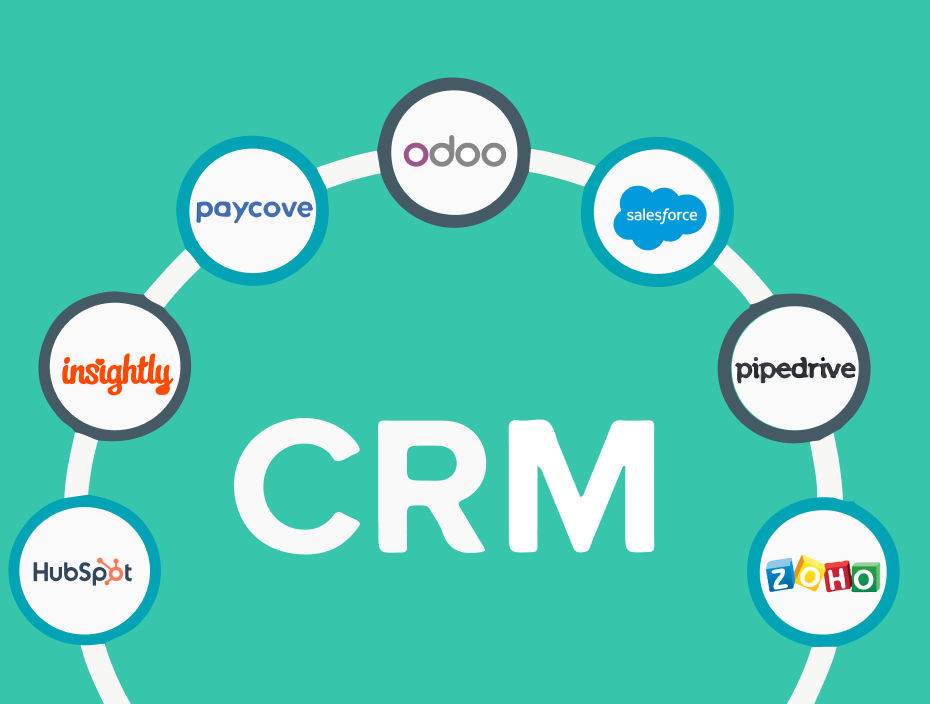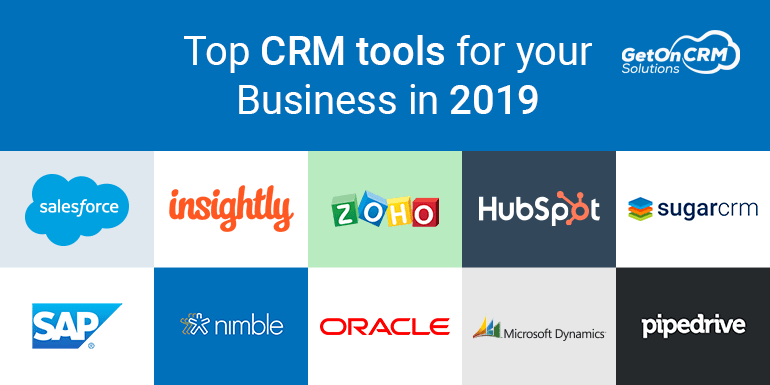In the ever-evolving business landscape, Common CRM Tools are taking center stage, empowering organizations with the ability to manage customer relationships effectively. These innovative solutions provide a comprehensive suite of features that streamline communication, enhance collaboration, and drive growth.
CRM tools come in various forms, each tailored to specific industry needs and business sizes. From cloud-based platforms to on-premise solutions, the market offers a wide array of options to choose from. Leading CRM providers like Salesforce, HubSpot, and Zoho offer robust capabilities that cater to businesses of all sizes.
Common CRM Tools

Customer Relationship Management (CRM) tools are designed to help businesses manage and track their interactions with customers. They provide a centralized platform for managing customer data, sales pipelines, marketing campaigns, and customer support.
Key Features and Benefits of CRM Tools
- Centralized customer data:CRM tools store all customer data in one place, making it easy to access and manage.
- Improved sales pipeline management:CRM tools help businesses track their sales pipeline and identify opportunities for growth.
- Automated marketing campaigns:CRM tools can automate marketing campaigns, such as email marketing and social media marketing.
- Enhanced customer support:CRM tools provide a platform for managing customer support tickets and tracking customer interactions.
Types of CRM Tools
There are three main types of CRM tools:
- Operational CRM:This type of CRM tool is designed to help businesses manage their day-to-day operations, such as sales, marketing, and customer service.
- Analytical CRM:This type of CRM tool is designed to help businesses analyze their customer data and identify trends.
- Collaborative CRM:This type of CRM tool is designed to help businesses collaborate with their customers and partners.
Popular CRM Tools in the Market
Some of the most popular CRM tools in the market include:
- Salesforce
- Microsoft Dynamics CRM
- Oracle Siebel CRM
- SAP Hybris Cloud for Customer Engagement
- HubSpot CRM
Benefits of Using CRM Tools
Customer relationship management (CRM) tools are essential for businesses of all sizes. They provide a centralized platform for managing customer data, tracking interactions, and automating tasks. This can lead to a number of benefits, including:
Improved customer relationships
CRM tools can help businesses improve customer relationships by providing a complete view of each customer’s history. This information can be used to personalize interactions, resolve issues quickly, and identify opportunities for upselling and cross-selling.
Increased sales
CRM tools can help businesses increase sales by providing insights into customer behavior. This information can be used to target marketing campaigns, develop new products and services, and improve customer service.
Reduced costs
CRM tools can help businesses reduce costs by automating tasks and streamlining processes. This can free up employees to focus on more strategic initiatives.
Success stories
There are many businesses that have benefited from using CRM tools. Here are a few examples:
- Salesforce: Salesforce is a leading provider of CRM software. The company’s customers have seen an average increase in sales of 23%.
- HubSpot: HubSpot is a marketing and sales software company. The company’s customers have seen an average increase in website traffic of 20%.
- Zoho: Zoho is a provider of online business software. The company’s customers have seen an average increase in customer satisfaction of 15%.
Challenges of Implementing CRM Tools
Implementing CRM tools can bring significant benefits to businesses, but it is not without its challenges. Common hurdles include:
- Data integration:Combining data from multiple sources into a single CRM system can be complex and time-consuming.
- User adoption:Getting employees to adopt and use the CRM tool effectively can be difficult.
- Cost:CRM tools can be expensive to purchase and implement.
- Technical issues:Integrating CRM tools with other systems and ensuring data security can be technically challenging.
Overcoming Implementation Challenges
To overcome these challenges, businesses can consider the following strategies:
- Plan thoroughly:Define clear goals, identify data sources, and establish a project plan before implementing the CRM tool.
- Get buy-in from stakeholders:Involve key stakeholders in the implementation process to ensure their support.
- Provide training and support:Train users on how to use the CRM tool effectively and provide ongoing support.
- Choose the right tool:Select a CRM tool that meets the specific needs of the business and is compatible with existing systems.
- Implement in phases:Break down the implementation process into smaller, manageable phases to reduce risk.
Case Studies
Several businesses have successfully implemented CRM tools to improve their operations. For example:
- Salesforce:Salesforce is a leading CRM provider that has helped businesses like Amazon, Google, and Toyota improve customer relationships and increase sales.
- HubSpot:HubSpot is a popular CRM tool that has helped businesses like Shopify, Trello, and Grammarly grow their revenue and improve customer satisfaction.
Choosing the Right CRM Tool: Common Crm Tools
Choosing the right CRM tool is crucial for businesses looking to improve their customer relationships. Here are some key factors to consider when making this decision:
- Business needs:Identify the specific business objectives and requirements that the CRM tool should address, such as sales tracking, customer support, or marketing automation.
- Industry and company size:Different industries and company sizes have varying CRM needs. Consider the industry-specific features and the number of users who will be using the tool.
- Budget:CRM tools can vary significantly in cost. Determine a realistic budget and consider both the initial investment and ongoing maintenance costs.
- Scalability:As businesses grow, their CRM needs may evolve. Choose a tool that can scale to meet future requirements.
- Integration:Consider how the CRM tool will integrate with existing business systems, such as ERP, accounting, or email marketing platforms.
- Ease of use:The CRM tool should be user-friendly and intuitive, ensuring that users can adopt it quickly and efficiently.
To assist in the selection process, here is a comparison table of different CRM tools:
| Tool | Features | Pricing | Industry Focus |
|---|---|---|---|
| Salesforce | Sales tracking, customer support, marketing automation, analytics | Starts at $25 per user per month | All industries |
| HubSpot | CRM, marketing automation, sales, customer service | Free plan available, paid plans start at $45 per month | Small businesses |
| Zoho CRM | CRM, sales, marketing, customer support, analytics | Free plan available, paid plans start at $12 per user per month | All industries |
| Microsoft Dynamics 365 | CRM, ERP, business intelligence, project management | Pricing varies based on modules and deployment | All industries |
| Pipedrive | Sales pipeline management, lead tracking, forecasting | Starts at $12.50 per user per month | Sales teams |
When evaluating and selecting the best CRM tool for a business, it is recommended to:
- Get user input:Involve key users in the evaluation process to gather their feedback and ensure the tool meets their needs.
- Request demos:Most CRM vendors offer free demos. Take advantage of these to see the tool in action and ask questions.
- Read reviews:Check online reviews and case studies to learn about the experiences of other businesses using the tool.
- Consider a trial period:Many CRM vendors offer trial periods. This allows businesses to test the tool before committing to a purchase.
Best Practices for Using CRM Tools

Effectively utilizing CRM tools requires a strategic approach that aligns with business goals and customer needs. Here are some best practices to guide you:
Centralize Customer Data
- Consolidate customer data from multiple sources into a central repository, ensuring a comprehensive and accurate view of customer interactions.
- Integrate CRM with other business systems, such as marketing automation and e-commerce platforms, to create a holistic customer profile.
Segment and Target Customers
- Use CRM data to segment customers based on demographics, behavior, and preferences.
- Create targeted marketing campaigns and personalized experiences tailored to each customer segment.
Automate Processes, Common crm tools
- Automate repetitive tasks, such as lead generation, appointment scheduling, and email follow-ups.
- Free up sales and customer service teams to focus on building relationships and driving revenue.
Track and Measure Performance
- Establish key performance indicators (KPIs) to track the effectiveness of CRM initiatives.
- Use CRM analytics to identify areas for improvement and optimize processes.
Foster User Adoption
- Provide training and support to ensure that users understand and embrace the CRM tool.
- Involve users in the implementation process to gather feedback and address concerns.
Case Studies
Numerous businesses have leveraged CRM tools to achieve remarkable success. Here are a few examples:
- Salesforce: Increased sales productivity by 25% and customer satisfaction by 30%.
- HubSpot: Reduced marketing costs by 50% and increased leads by 60%.
- Zoho CRM: Improved customer retention by 15% and reduced churn by 20%.
Conclusion
In conclusion, Common CRM Tools have revolutionized the way businesses manage customer relationships. By providing a centralized platform for managing customer data, automating workflows, and tracking interactions, these tools empower organizations to deliver exceptional customer experiences, drive growth, and stay ahead in the competitive market landscape.